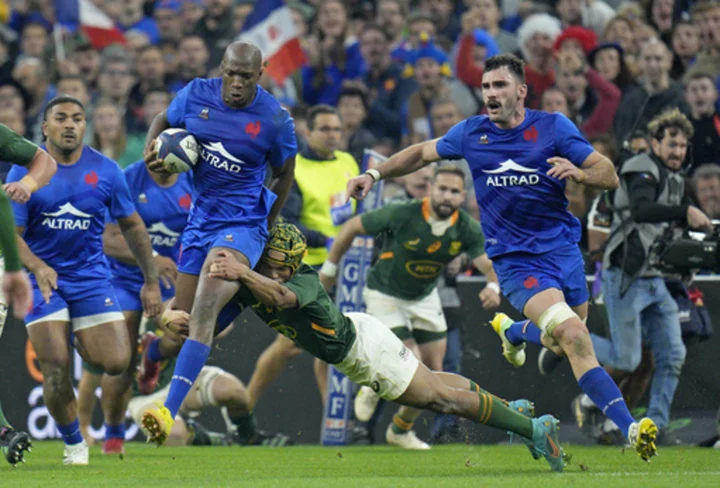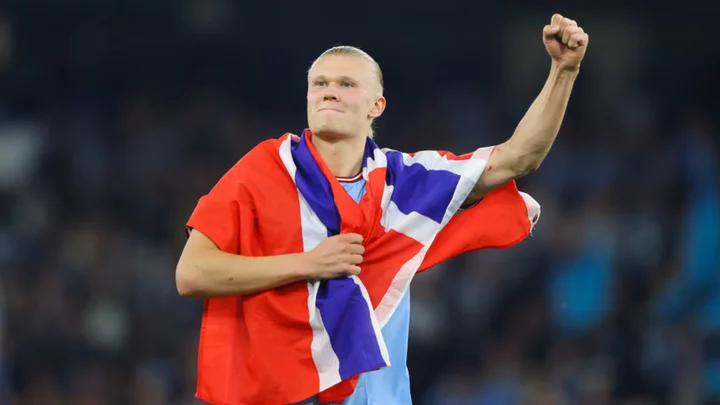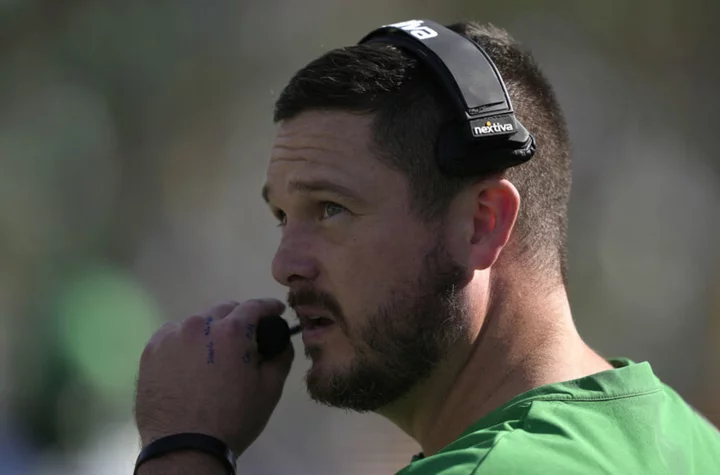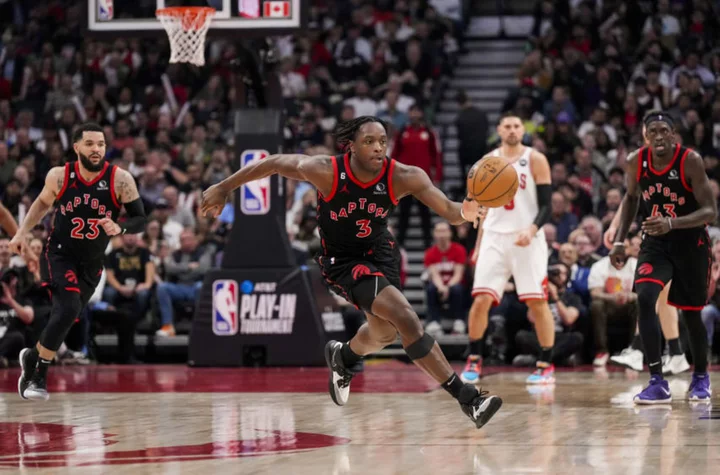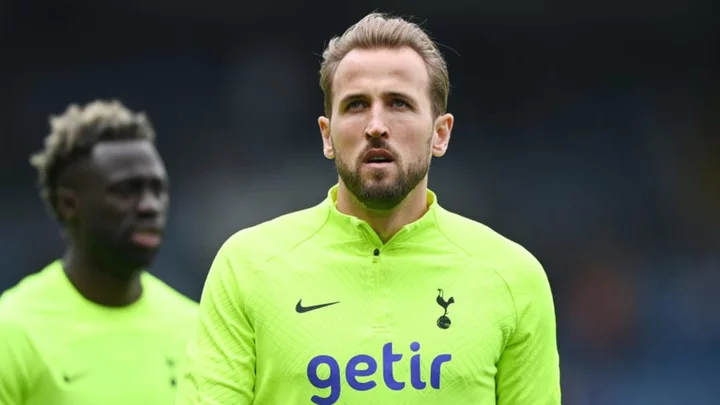PARIS (AP) — There's a good chance — two very good chances, actually — that the 2023 Rugby World Cup will be the year of the North.
Top-ranked Ireland and host nation France both provide compelling reasons to believe that the southern hemisphere's 16-year hold on the Webb Ellis Cup might be over some time around 11 p.m. on Saturday, Oct. 28 in the Paris outskirts, where the glitter falls on the final in front of an expected 81,000 people at Stade de France.
A maiden title for either would give the trophy a home north of the equator for the first time since Jonny Wilkinson drop-kicked England to victory in 2003. That was almost another era of rugby and is the only northern hemisphere triumph in the nine World Cups played so far.
“We have been open and honest about our ambitions,” said Ireland captain Jonathan Sexton, whose team has a righteous claim to being No. 1 in the world after a run of 13 wins dating to an historic series success in New Zealand in July 2022 — the result that really made the Irish believe.
France has the world's best player in the supremely gifted scrumhalf Antoine Dupont, and the stats to back up its stylish play, beating world champion South Africa and New Zealand in its last matches against the southern hemisphere's best and the winners of the last four World Cups.
Those games were both in France, but that's entirely relevant for the next two months when Les Tricolores get to test their renaissance in front of home fans across the length and breadth of their republic, although it will be without flyhalf Romain Ntamack, whose injury robbed the tournament of one of its stars.
Still, France, which has an Olympics coming to its capital next year, is in the mood for a sporting celebration. Thousands stayed in their Stade de France seats long after Australia was beaten in the last warmup to applaud France on a lap of honor, and 3,000 alone turned up in the seaside town of Seignosse just to watch the team train recently.
“We are getting used to this expectation. It’s pure happiness,” France coach Fabien Galthie said. “We want to share and bring people together.
“It’s a joy for us, a pleasure, and we’re happy to soak up this energy. We will need it.”
Notably, Ireland and France have mental Rugby World Cup hurdles to clear. Ireland has never passed the quarterfinals and was highly rated — although not this highly rated — four years ago when New Zealand rampaged to a 46-14 win to see Irish eyes crying again early in the knockout stages.
France has lost three finals — two to New Zealand — and knows more than most teams how nearly is not good enough.
Both will get stern early tests of their credentials, as early as the opening game for France when it plays New Zealand next Friday in what World Rugby CEO Alan Gilpin called “an absolute blockbuster.”
Every fan agrees, as rugby celebrates 200 years since an Englishman by the name of William Webb Ellis picked up a soccer ball and ran with it as the myth goes, and a new game was born.
Ireland is in the same group as the Springboks, and that mouthwatering matchup two weeks into the tournament — top challenger vs. defending champion — might also give an indication whether the North-South power balance has truly shifted.
South Africa beat New Zealand 35-7 in the final warmup for both rugby powers, a result that galvanized the Springboks' hopes of back-to-back titles for the first time and winning a fourth World Cup that would give them the record outright ahead of the All Blacks, and be a fitting farewell to departing coach Jacques Nienaber.
“We got squeezed and exposed,” New Zealand coach Ian Foster said of a brute-force Springboks display. “Maybe this will take a lot of heat off us. No one will rate us now.”
While Foster went for a positive spin, the All Blacks' heaviest defeat so close to the World Cup has seen the doubts that haunted Foster and his team through a mediocre 2022 re-emerge.
There's also a chance it was a hiccup.
Before that jarring loss at Twickenham, New Zealand had a super-smooth season, beating South Africa, Argentina and Australia (twice) and clinching a third straight southern hemisphere title with little trouble. A bunch of bookmakers — who seldom get it too wrong — still have the All Blacks as favorites and odds-on to be the first to four World Cup titles.
After Ireland, France, South Africa and New Zealand, there's a sizeable gap to the rest.
But a quirk in the tournament draw, which was made three years ago, has those big four all in the same half of the competition. That means two of them at most will get past the quarterfinals, giving this Rugby World Cup a big headline day halfway through.
Who's going home early?
While some fans are dismayed it'll work out that way, it leaves an avenue of opportunity on the other side of the draw, where Wales, Australia, England and Argentina — all of whom are struggling to some degree — have reason to be a little more positive.
Eddie Jones is back for a second spell as coach of Australia and he rarely lets a World Cup pass without making an impact, whether it's his team on the field or his lively comments in the press room.
For outsiders, the Pacific Island teams often overachieve and Fiji beat England in the buildup to lay down a warning to pool rivals Wales and Australia. Chile will make its tournament debut, giving the Rugby World Cup three teams from soccer-mad Latin America for the first time — the Chileans, Argentina and Uruguay. It's a step forward for growing a sport that is heading to a new market, the United States, for the 2031 World Cup.
Alas, the Eagles will not be at this edition, having failed to qualify for the first time since 1995 — seven World Cups ago.
The 2023 tournament comes amid an increasing crackdown on high tackles and contact to the head by the game's rule makers, prompted by concerns over player welfare. Yellow and red cards will likely be flashed more regularly, with zero tolerance from officials in that area now.
To help, World Rugby will use its “bunker review system" for the first time at a World Cup, where a player sent to the sin-bin for 10 minutes can have his yellow card upgraded to red on review by the television match official.
That could bring some chaos to the tournament, though expect the traditional powers to rise above it and be there at the end.
That is typically the All Blacks and the Springboks.
Ireland and France might have something to say about that this time.
___
AP writer Gerald Imray contributed.
___
AP rugby: https://apnews.com/hub/rugby

